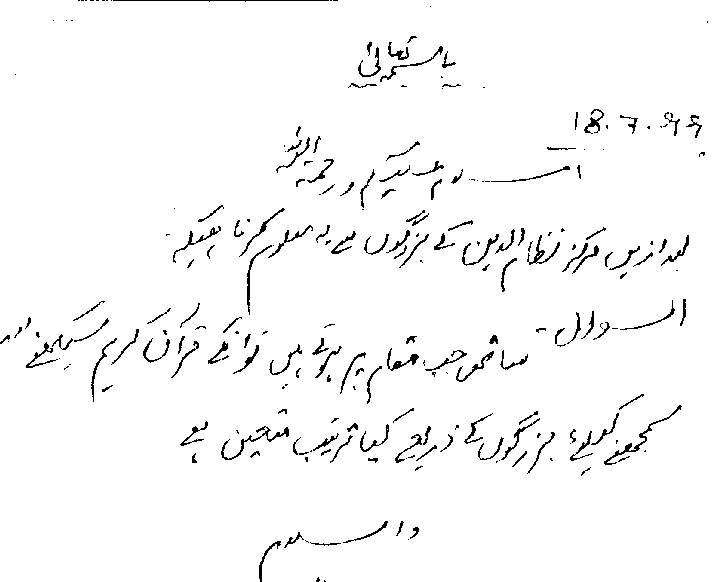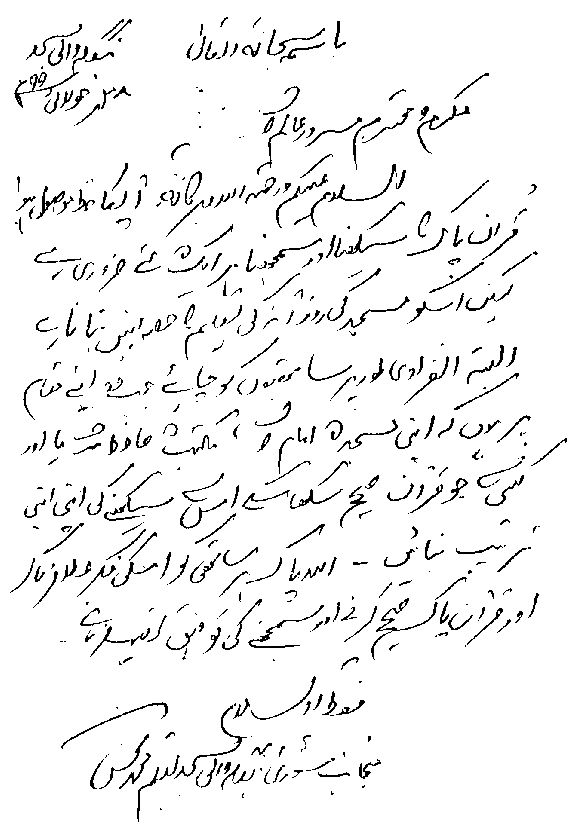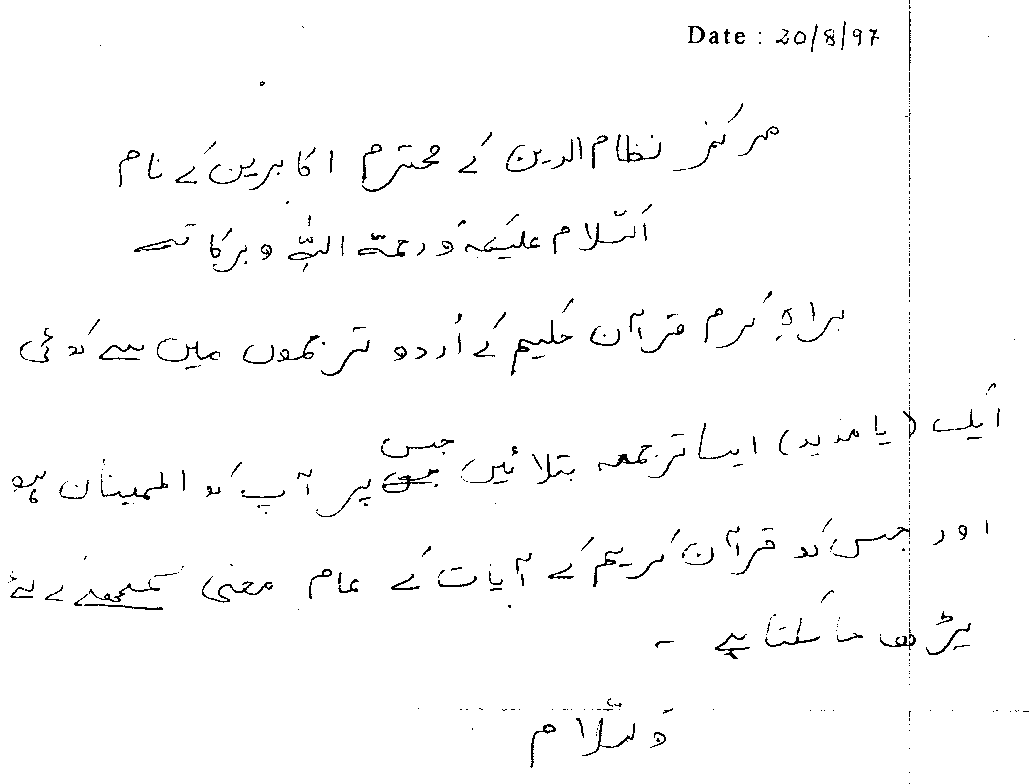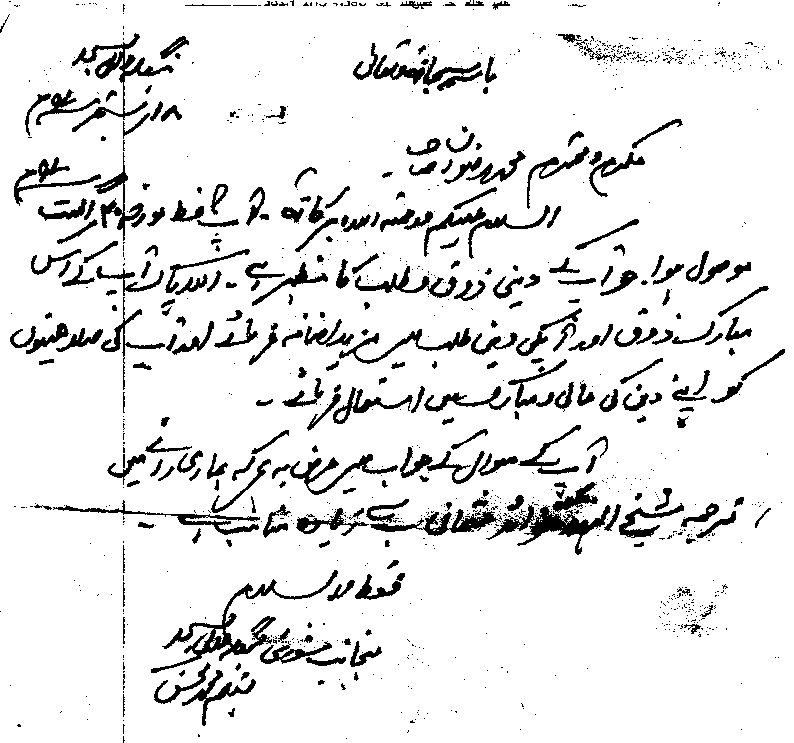
|
|
|
|
First eeman ; afterwards Qur-aan.
We often hear the speakers of the Tableegh Jamaa'ath say in their bayaans
(speeches):
|
|
|
|
|
|
It is a known fact that the laws were revealed gradually and that the strong faith of the companions facilitated the ready assimilation of the laws. But how can one imagine strengthening of the faith without Qur-aan ??? And how can we delink the two, Eemaan and Qur-aan ? Everybody knows that the prophethood of our prophet began with the revelation of Qur-aanic verses.
Again, how can we delink the two : Eemaan and Qur-aan, while the influence of the very same Qur-aanic verses was instrumental in bringing into the fold of Islaam, many a companions of the prophet.
Let us read two Qur-aanic verses, which affirm that the faith of the
faithful does increase when they hear Allaah's Aayaat, the Qur-aanic verses.

" For, Believers are those who, when Allah is mentioned, feel
a tremor in their hearts, and when they hear His Signs (Aayaat) rehearsed,
find their faith strengthened, and put their trust in their Lord. "
(8:2) 
" Whenever there comes down a Sura, some of them say: "Which of you has had his faith increased by it?" Yea, those who believe, their faith is increased, and they do rejoice. " (9:124)
What is their purpose in repeating this statement : First eeman ; afterwards Qur-aan.?
They profess that faith is essential to practise the religion truly. Therefore, they describe this movement as an effort to strengthen the faith. And they know that the recital of Qur-aan will increase the faith of the faithful. But, ironically, they keep the faithful away from Qur-aan by repeatedly saying First eeman ; later Qur-aan. It is like putting the cart before the horse.
They claim that in the present age, this is the only method to strengthen faith : set out in "the path of Allaah" for four months. During the period they are on the long expedition, they hardly learn anything from Qur-aan. In fact, a relative of mine said that he and the brothers who were with him on a four-month expedition, defied the ameer (leader) of their Jamaa'ath (group) by consistently exceeding the daily 'quota' of reciting Qur-aan, permitted to them. May Allaah forgive us for that, said he.
The behaviour of restricting the effort for learning Qur-aan is not confined to just one ameer. In fact it spreads from the very top of the movement.
|
|
I know that the word Qur-aan is an anathema to their elders.
But would they admit this is writing ? To check this, a question was put
to them, in the following manner.

|
|
We know that the only program they have for Qur-aan is the ten-minute-a-day correction of recital done in the so-called "Qur-aani halkha", (Qur-aanic study-circle), that is held while on expedition. Here, the matter doesn't go beyond the mere recital of the ten small surahs of Qur-aan. If we ask them what programme they have for learning Qur-aan, they will brag about this activity. So we will not dispute about that and let them boast about it to show that Qur-aan is indeed there in their agenda.
So I asked them as to what is the activity with regards to learning and understanding Qur-aan, when the members are at home.
Let us see their answer below :
| Assalaamu Alaikum.
|

They say that it is necessary for everyone to learn and understand Qur-aan.
Yet let that not encroach into the time and space occupied by their book
: Fazaail-e-A'amaal, the reading of which goes by the name of daily
teaching in mosque (Masjid ki rozaana ki ta'aleem, in Urdu).
They say, in not so many words : Find another time and place for Qur-aan. Let it be an individual effort. Do not make it a collective program. Let it not be a group (Jamaa'ath) activity. Let Allaah grant the concern and the good fortune to learn Qur-aan.
To make the members read their misleading book, Fazaail-e-A'amaal, there is a method, there is a time and place and there is a collective programme prescribed. They even go on a door-to-door survey to find out if their book is being read daily in the houses. If not, they advise that for the benefit of people at home, the book should be read daily.
That is their real face, vis-a-vis Qur-aan.
One more letter was sent to them to enquire about Qur-aan. This one
is about reading the translation of Qur-aan. Some members of the Jamaa'ath
discourage reading of translations on the pretext that the particular translation,
(whichever translation is being studied at that moment), is not reportedly
correct. So a question was put to the Tableegh Jamaa'ath headquarters in
the following manner :

|
|
The intention of writing this letter was : to show to the local members,
as and when a reply is received, that their elders do not disapprove reading
of the translation of Qur-aan. But the reply was cleverer. They wrote back
:

| " Assalaamu Alaikum wa rahmathullaahi wa barakaathuhu.
Your letter dated 20th August 1997 was received, which is demonstrative of your enthusiasm and craving for deen. Let Allaah increase in you further this blessed enthusiasm and your craving for deen and use your capabilities in the furtherance and promotion of His deen. In reply to your question, it is stated that in our opinion the translation of Sheikhul Hind with Usmaani notes is more suitable. " |
If I show this letter to anyone, surely they will fail to grasp what this letter is talking about. One missing word Qur-aan, made all the difference. Translation of what and suitable for what? Was I wrong when I stated earlier that the word Qur-aan is anathema to these elders. In a letter consisting of 80 words, is it so abominable in their sight to mention the word Qur-aan ??? To avoid the letter from looking bland, fillers have been added generously in the beginning. Only the underlined words consist the reply. Nevertheless, the camouflage is too glaring to be missed.
No mike for Qur-aan in their headquarters.
In the headquarters of the Jamaa'ath in Nizamuddeen, Delhi, microphone is not provided for the Imaam leading the fard (obligational) prayers. Instead a microphone is provided for the mukabbir (a person who repeats the takbeer, etc. of the Imaam). As a result, only persons standing in the first few rows could faintly hear the recitation of Qur-aan. The others in the back rows and in the upper floors are deprived from hearing the Qur-aan.
The same is true of the large gatherings (ijtema) they hold. Here, apart from being deprived of hearing the recital of Qur-aan, the crowds in the back cannot hear the takbeer also and one has to look to the people in front to know when to do the next act, even if one is in prostration. This leads to utter chaos and pitiable position.
This maltreatment is only for Qur-aan, all in the name of preserving the tradition of the times of the prophet. When it comes to broadcasting the speech of the elders, there is no such necessity to follow the tradition. Mikes and loudspeakers are provided for the elders and all the people in the venue of the ijtema could clearly hear their speeches.
|
|
||
|
|
|